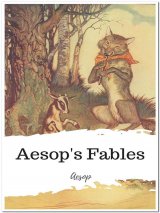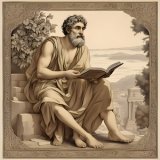Aesop's Fables Page #4
Aesop's Fables, or the Aesopica, is a collection of fables credited to Aesop, a slave and storyteller believed to have lived in ancient Greece between 620 and 564 BCE.
Do not count your chickens before they are hatched. THE DOLPHINS, THE WHALES, AND THE SPRAT The Dolphins quarrelled with the Whales, and before very long they began fighting with one another. The battle was very fierce, and had lasted some time without any sign of coming to an end, when a Sprat thought that perhaps he could stop it; so he stepped in and tried to persuade them to give up fighting and make friends. But one of the Dolphins said to him contemptuously, "We would rather go on fighting till we're all killed than be reconciled by a Sprat like you!" THE FOX AND THE MONKEY A Fox and a Monkey were on the road together, and fell into a dispute as to which of the two was the better born. They kept it up for some time, till they came to a place where the road passed through a cemetery full of monuments, when the Monkey stopped and looked about him and gave a great sigh. "Why do you sigh?" said the Fox. The Monkey pointed to the tombs and replied, "All the monuments that you see here were put up in honour of my forefathers, who in their day were eminent men." The Fox was speechless for a moment, but quickly recovering he said, "Oh! don't stop at any lie, sir; you're quite safe: I'm sure none of your ancestors will rise up and expose you." Boasters brag most when they cannot be detected. THE ASS AND THE LAP-DOG There was once a man who had an Ass and a Lap-dog. The Ass was housed in the stable with plenty of oats and hay to eat and was as well off as an ass could be. The little Dog was made a great pet of by his master, who fondled him and often let him lie in his lap; and if he went out to dinner, he would bring back a tit-bit or two to give him when he ran to meet him on his return. The Ass had, it is true, a good deal of work to do, carting or grinding the corn, or carrying the burdens of the farm: and ere long he became very jealous, contrasting his own life of labour with the ease and idleness of the Lap-dog. At last one day he broke his halter, and frisking into the house just as his master sat down to dinner, he pranced and capered about, mimicking the frolics of the little favourite, upsetting the table and smashing the crockery with his clumsy efforts. Not content with that, he even tried to jump on his master's lap, as he had so often seen the dog allowed to do. At that the servants, seeing the danger their master was in, belaboured the silly Ass with sticks and cudgels, and drove him back to his stable half dead with his beating. "Alas!" he cried, "all this I have brought on myself. Why could I not be satisfied with my natural and honourable position, without wishing to imitate the ridiculous antics of that useless little Lap-dog?" THE FIR-TREE AND THE BRAMBLE A Fir-tree was boasting to a Bramble, and said, somewhat contemptuously, "You poor creature, you are of no use whatever. Now, look at me: I am useful for all sorts of things, particularly when men build houses; they can't do without me then." But the Bramble replied, "Ah, that's all very well: but you wait till they come with axes and saws to cut you down, and then you'll wish you were a Bramble and not a Fir." Better poverty without a care than wealth with its many obligations. THE FROGS' COMPLAINT AGAINST THE SUN Once upon a time the Sun was about to take to himself a wife. The Frogs in terror all raised their voices to the skies, and Jupiter, disturbed by the noise, asked them what they were croaking about. They replied, "The Sun is bad enough even while he is single, drying up our marshes with his heat as he does. But what will become of us if he marries and begets other Suns?" THE DOG, THE COCK, AND THE FOX A Dog and a Cock became great friends, and agreed to travel together. At nightfall the Cock flew up into the branches of a tree to roost, while the Dog curled himself up inside the trunk, which was hollow. At break of day the Cock woke up and crew, as usual. A Fox heard, and, wishing to make a breakfast of him, came and stood under the tree and begged him to come down. "I should so like," said he, "to make the acquaintance of one who has such a beautiful voice." The Cock replied, "Would you just wake my porter who sleeps at the foot of the tree? He'll open the door and let you in." The Fox accordingly rapped on the trunk, when out rushed the Dog and tore him in pieces. THE GNAT AND THE BULL A Gnat alighted on one of the horns of a Bull, and remained sitting there for a considerable time. When it had rested sufficiently and was about to fly away, it said to the Bull, "Do you mind if I go now?" The Bull merely raised his eyes and remarked, without interest, "It's all one to me; I didn't notice when you came, and I shan't know when you go away." We may often be of more consequence in our own eyes than in the eyes of our neighbours. THE BEAR AND THE TRAVELLERS Two Travellers were on the road together, when a Bear suddenly appeared on the scene. Before he observed them, one made for a tree at the side of the road, and climbed up into the branches and hid there. The other was not so nimble as his companion; and, as he could not escape, he threw himself on the ground and pretended to be dead. The Bear came up and sniffed all round him, but he kept perfectly still and held his breath: for they say that a bear will not touch a dead body. The Bear took him for a corpse, and went away. When the coast was clear, the Traveller in the tree came down, and asked the other what it was the Bear had whispered to him when he put his mouth to his ear. The other replied, "He told me never again to travel with a friend who deserts you at the first sign of danger." Misfortune tests the sincerity of friendship. THE SLAVE AND THE LION A Slave ran away from his master, by whom he had been most cruelly treated, and, in order to avoid capture, betook himself into the desert. As he wandered about in search of food and shelter, he came to a cave, which he entered and found to be unoccupied. Really, however, it was a Lion's den, and almost immediately, to the horror of the wretched fugitive, the Lion himself appeared. The man gave himself up for lost: but, to his utter astonishment, the Lion, instead of springing upon him and devouring him, came and fawned upon him, at the same time whining and lifting up his paw. Observing it to be much swollen and inflamed, he examined it and found a large thorn embedded in the ball of the foot. He accordingly removed it and dressed the wound as well as he could: and in course of time it healed up completely. The Lion's gratitude was unbounded; he looked upon the man as his friend, and they shared the cave for some time together. A day came, however, when the Slave began to long for the society of his fellow-men, and he bade farewell to the Lion and returned to the town. Here he was presently recognised and carried off in chains to his former master, who resolved to make an example of him, and ordered that he should be thrown to the beasts at the next public spectacle in the theatre. On the fatal day the beasts were loosed into the arena, and among the rest a Lion of huge bulk and ferocious aspect; and then the wretched Slave was cast in among them. What was the amazement of the spectators, when the Lion after one glance bounded up to him and lay down at his feet with every expression of affection and delight! It was his old friend of the cave! The audience clamoured that the Slave's life should be spared: and the governor of the town, marvelling at such gratitude and fidelity in a beast, decreed that both should receive their liberty.
Translation
Translate and read this book in other languages:
Select another language:
- - Select -
- 简体中文 (Chinese - Simplified)
- 繁體中文 (Chinese - Traditional)
- Español (Spanish)
- Esperanto (Esperanto)
- 日本語 (Japanese)
- Português (Portuguese)
- Deutsch (German)
- العربية (Arabic)
- Français (French)
- Русский (Russian)
- ಕನ್ನಡ (Kannada)
- 한국어 (Korean)
- עברית (Hebrew)
- Gaeilge (Irish)
- Українська (Ukrainian)
- اردو (Urdu)
- Magyar (Hungarian)
- मानक हिन्दी (Hindi)
- Indonesia (Indonesian)
- Italiano (Italian)
- தமிழ் (Tamil)
- Türkçe (Turkish)
- తెలుగు (Telugu)
- ภาษาไทย (Thai)
- Tiếng Việt (Vietnamese)
- Čeština (Czech)
- Polski (Polish)
- Bahasa Indonesia (Indonesian)
- Românește (Romanian)
- Nederlands (Dutch)
- Ελληνικά (Greek)
- Latinum (Latin)
- Svenska (Swedish)
- Dansk (Danish)
- Suomi (Finnish)
- فارسی (Persian)
- ייִדיש (Yiddish)
- հայերեն (Armenian)
- Norsk (Norwegian)
- English (English)
Citation
Use the citation below to add this book to your bibliography:
Style:MLAChicagoAPA
"Aesop's Fables Books." Literature.com. STANDS4 LLC, 2025. Web. 7 Jan. 2025. <https://www.literature.com/book/aesop%27s_fables_316>.




Discuss this Aesop's Fables book with the community:
Report Comment
We're doing our best to make sure our content is useful, accurate and safe.
If by any chance you spot an inappropriate comment while navigating through our website please use this form to let us know, and we'll take care of it shortly.
Attachment
You need to be logged in to favorite.
Log In